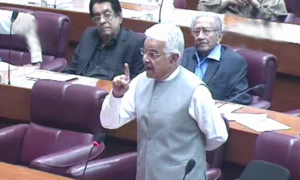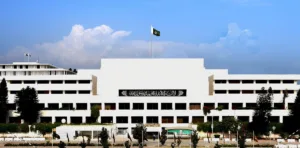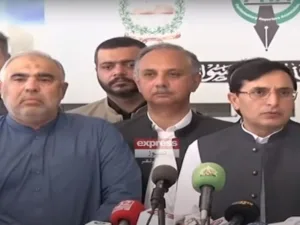Operation ‘Azm-e-Istehkam
Pakistan Defence Minister Khawaja Asif announced on Sunday that Parliament will be consulted on any new military offensive against terrorists, following demands from former Prime Minister Imran Khan’s party. The decision to launch the ‘Azm-e-Istehkam’ operation was made during an apex committee meeting of the National Action Plan, a 2014 strategy to eliminate militancy. However, lawmakers from the Pakistan Tehreek-i-Insaf (PTI) insisted that such decisions should be discussed in Parliament, the highest forum for such matters.

Consultation with Parliament on Military Offensives
Pakistan Defence Minister Khawaja Asif announced on Sunday that Parliament will be consulted on any new military offensive against terrorists, following demands from former Prime Minister Imran Khan’s party. The decision to launch the ‘Azm-e-Istehkam’ operation was made during an apex committee meeting of the National Action Plan, a 2014 strategy to eliminate militancy. However, lawmakers from the Pakistan Tehreek-i-Insaf (PTI) insisted that such decisions should be discussed in Parliament, the highest forum for such matters.

Parliamentary Debate Initiated
Pakistan Defence Minister Khawaja Asif initially criticized the PTI, stating that the Khyber Pakhtunkhwa (KP) Chief Minister was present during the decision-making meeting. However, he later announced that the issue of the new military offensive would be presented before Parliament. “We will bring this issue to the House for debate. If they have any objections, they can voice them when the issue is discussed in Parliament,” Asif stated.
Accusations and Counterclaims
Defence Minister Khawaja Asif accused the PTI of siding with terrorists, stating, “They (PTI) are standing with the terrorists by protesting here today. They are protesting against the martyrs of the Pakistan Army and the army that is still making sacrifices against terrorism.” He criticized the PTI leadership for not distancing themselves from their stance on the May 9 attacks on military installations, accusing the party of changing its stance to serve its own interests.
PTI’s Assertion on Parliamentary Authority
Earlier, speaking to the media outside Parliament House, PTI chief Gohar Khan emphasized that only Parliament is empowered to decide on military operations. “If there is any operation — intelligence-based or full-fledged — it is necessary to take Parliament into confidence,” he stated, adding that no committee can supersede Parliament. Former speaker and PTI leader Asad Qaiser echoed this demand, insisting that any decision about an operation be brought before Parliament. During the parliamentary session, PTI lawmakers chanted slogans against the proposed operation.

Security Concerns and Economic Impact
The announcement to launch a new offensive came after an apex committee meeting, chaired by Prime Minister Shehbaz Sharif and attended by key officials, highlighted security as a primary concern for the China-Pakistan Economic Corridor (CPEC). “Security threats are the main hazards to CPEC cooperation. Confidence is more precious than gold, and the primary factor shaking the confidence of Chinese investors is the security situation,” Liu Jianchao stated.
Historical Context of Military Operations
Azm-i-Istehkam is the latest in a series of counterterrorism operations by the Pakistan Army over the past two decades. The most notable include Operation Zarb-i-Azb, launched by General Raheel Sharif in 2014 following the Peshawar School attack, and Operation Raddul Fasaad, initiated by General Qamar Javed Bajwa in 2017 to eliminate residual terrorist threats. Earlier, in 2008, operations expelled rebels from the Swat region of Khyber-Pakhtunkhwa.
Outcome and Need for a New Offensive
The previous operations achieved significant tactical successes, such as reducing terrorist incidents and eliminating high-value targets. However, they did not completely eradicate militancy, necessitating a new offensive.
